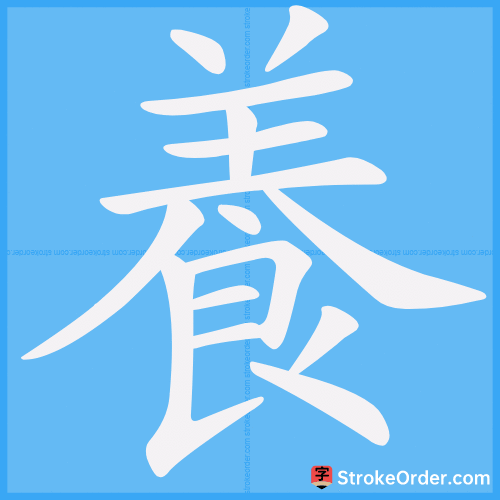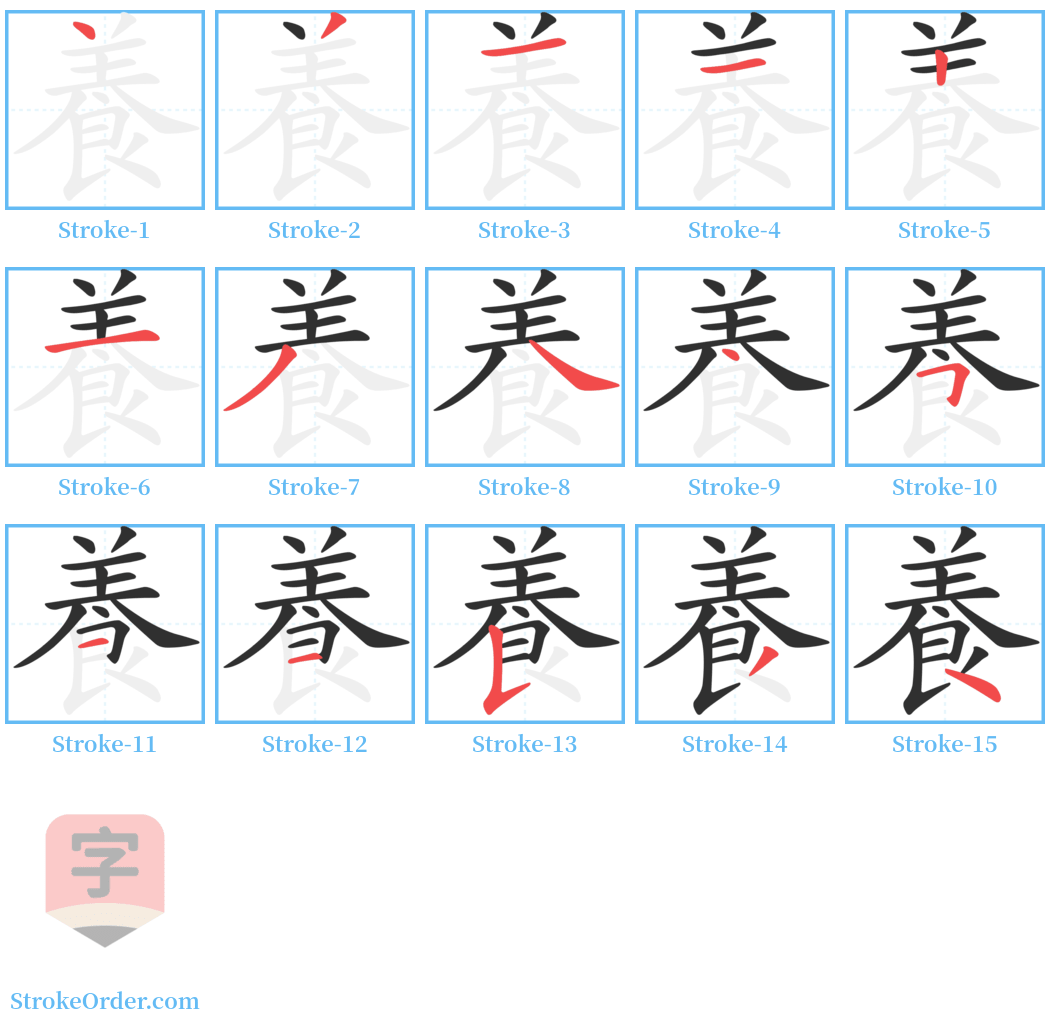養 Stroke Order
Animated Stroke Order of 養

Stroke Order Diagrams for 養

Step-by-Step Handwriting Guide for 養

Learn to Write Chinese Characters with Video Tutorials
Watch the video of writing the Chinese character "養", learn the correct stroke order (笔顺) of the character "養", and master the standard way of writing the character "養".
Free Printable Handwriting Practice with Stroke Order: 養
Printable Writing Practice Worksheet of "養" in Portrait Orientation (Tian Zi Ge)

Printable Writing Practice Worksheet of "養" in Landscape Orientation (Tian Zi Ge)

Information of 養
Pinyin
yǎng
Radical
飠
Strokes
14 strokes
Usage
★★★
Definition
give birth / keep (pets) / to support / to bring sb. up / to raise (pig, etc.)
養
Meaning:
1. 照顾、抚育。 (To care for and nurture.)
2. 培植花木或饲养动物。 (To cultivate flowers or raise animals.)
3. 陶冶品德。 (To cultivate one's character.)
4. 教导、教育。 (To teach and educate.)
5. 治疗、调护。 (To treat and care for.)
6. 增加、助长。 (To increase and promote.)
7. 信守、保持。 (To uphold and maintain.)
8. 姓。如春秋时楚国有养由基。 (A surname, as found in the state of Chu during the Spring and Autumn period.)
Usage examples:
1. 照顾、抚育。如:“抚养”、“养民”。《礼记·大学》:“未有学养子,而后嫁者也。”《史记·卷一一二·主父偃传》:“百姓靡敝,孤寡老弱不能相养。” (To care for and nurture, e.g., "to raise," "to care for the people." See "The Book of Rites, Great Learning": "There is no one who first learned to nurture sons and then married." See "Records of the Grand Historian, Volume 112, Biography of Zhu Fu Yan": "The people were impoverished, and the elderly and the weak could not support one another.")
2. 培植花木或饲养动物。如:“养兰”、“养鸡”。《周礼·夏官·圉人》:“圉人,当养马芻牧之事。” (To cultivate flowers or raise animals, e.g., "to grow orchids," "to raise chickens." See "The Rites of Zhou, The Summer Official, The Keeper of Horses": "The keeper of horses is responsible for the feeding and grazing of horses.")
3. 陶冶品德。如:“修养品德”。《孟子·尽心下》:“养心莫善于寡欲。” (To cultivate one's character, e.g., "to cultivate virtue." See "The Book of Mencius, Part of Complete Heart": "The best way to nurture the heart is to have fewer desires.")
4. 教导、教育。《周礼·地官·保氏》:“保氏掌谏王恶,而养国子以道,乃教之六艺。”《汉书·卷八十八·儒林传·序》:“或言孔子布衣,养徒三千人。” (To teach and educate. See "The Rites of Zhou, The Earth Official, The Keeper of the State": "The Keeper counsels against the king's wrongs and nurtures the national scholars with principles, thereby teaching them the Six Arts." See "The Book of Han, Volume 88, The Biography of Confucian Scholars, Preface": "Some say that Confucius, dressed as a commoner, nurtured three thousand disciples.")
5. 治疗、调护。如:“调养”、“养颜”、“养病”。《儒林外史·第五回》:“再折些须银子给他养那打坏了的腿。” (To treat and care for. e.g., "to recuperate," "to maintain one's complexion," "to recuperate from illness." See "The Scholars, Chapter 5": "Give him some silver to take care of his injured leg.")
6. 增加、助长。《左传·昭公二十年》:“私欲养求,不给则应。”《孔颖达·正义》:“私有所欲,长养其情,求物共之,民不共给,则应之以罪。” (To increase and promote. See "The Zuo Tradition, Year 20 of Duke Zhao": "Personal desires nourish demands; if not supplied, they must face consequences." See "Kong Yingda's Commentary": "If there are personal desires, the sentiments will flourish; if the needs are not met, the people will respond with punishment.")
7. 信守、保持。《荀子·礼论》:“龙旗九斿,所以养信也。” (To uphold and maintain. See "Xunzi, On Rites": "The Nine Banners of the Dragon are to uphold trust.")
8. 姓。如春秋时楚国有养由基。 (A surname. For example, there was Ying Youji in the state of Chu during the Spring and Autumn period.)
养 yǎng
Part of speech: verb
Original meaning: to feed and nourish.
Etymology: Phonetic compound. The character is made up of the radicals for food and the sound of sheep.
1. 供养,奉养; 抚育 (To support; provide for; nurture.)
2. 饲养 (To raise.)
3. 生育 (To give birth to.)
4. 培养,修养 (To cultivate; foster.)
5. 保养 (To convalesce; recuperate one's health.)
6. 治,调养 (To nourish.)
7. 蓄养 (To cultivate and retain.)
8. 貯藏 (To store up.)
9. 隐,隐蔽 (To hide.)
Adjective:
1. 由非亲生父母的人养育的 (Raised by adoptive or foster parents.)
2. 通“痒”。皮肤受刺激,产生欲搔的感觉 (Itchy; producing a desire to scratch.)
Noun:
1. 姓 (A surname.)
2. 晚辈对长辈的供养 (Support by younger generations for their elders.)
For example:
- 奉养父母 (To support one's parents.)
- 《孟子·离娄下》:“惰其四支,不顾父母之养,一不孝也。” (Mencius, Part of Li Lou: "To neglect one's limbs and disregard the support provided by one's parents is a form of unfilial behavior.")